SUNFLOWER DENTAL SPA
Restorative dentistry is a type of dentistry that focuses on repairing/replacing teeth. The primary goal is to improve functionality and health. Some of the common restorative dentistry procedures we offer at Sunflower Dental Spa are dental crowns and bridges.
If you have the following, you may need restorative dental procedures:
Many people use the terms restorative dentistry and cosmetic dentistry interchangeably, but they are different. Restorative procedures improve functionality and oral health, while cosmetic procedures focus on aesthetics.
Restorative dental procedures improve your ability to speak, laugh, eat, and smile- while also improving your overall oral health. If you are in or near Rockledge, Florida contact Sunflower Dental Spa for your restorative dentistry needs. Dr. Barbara Wetmore is looking forward to working with you to restore your beautiful smile and your confidence.
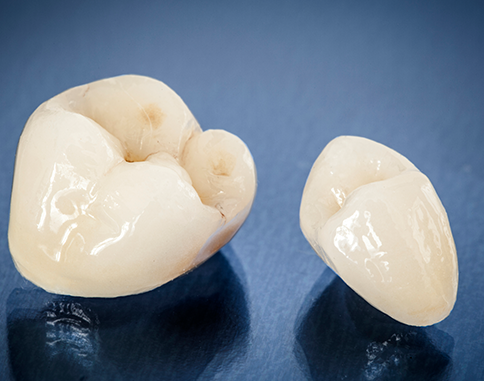
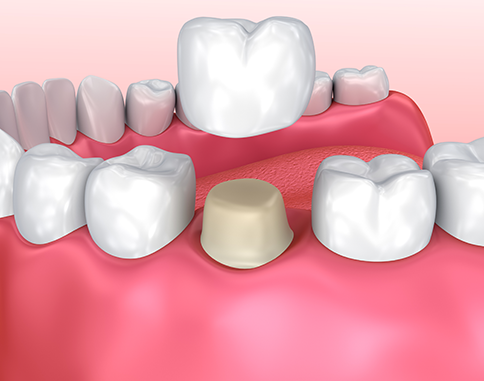
A crown is necessary if the affected tooth would:


The first step is consultation. During this visit, we will take x-rays and Dr. Wetmore will examine your mouth to determine if you need crowns on any of your teeth. If you do and you're planning on getting ceramic, she will take note of the color of the neighboring teeth to determine the shade of the crown- especially if it is a front tooth.
You should also be prepared to ask questions and bring up any concerns you have at this time. If you have dental anxiety, please let us know and we'll discuss our sedation options.
The next step is to prepare the tooth for the crown. We may need to file the tooth down to ensure that the crown fits properly. You will be given a local anesthetic to numb the area before we start working.
Once the tooth preparation is complete, a gingival retraction will be done to provide a clear view of your tooth. Then, an impression of the affected tooth will be taken. The impression will be sent to the lab where a dental tech will make your crown.
Before you leave the office, Dr. Wetmore will place a temporary crown on the affected tooth to protect it while waiting for the permanent one to come in. Once the permanent crown does come in, we will schedule an appointment to have it placed.
When the permanent crown comes in, the temporary one will be removed, and the tooth cleaned so it can be put on. Dr. Wetmore will make sure that it fits properly before cementing it in place. Once the crown is in place, we will check your bite. In some cases, the opposing tooth may need to be filed down.
You must maintain proper oral hygiene, including brushing and flossing because the tooth under the crown is affected by your oral health. Since so much effort is put into ensuring a proper fit, a crown can typically handle pressure from talking, biting, and chewing.
Taking care of your dental crown isn't much different from taking care of your other teeth- but everyone is different. If you require special care steps, Dr. Wetmore will let you know.
There are several different types of materials used in dental crowns:
The material that we use will depend on your personal needs/preferences, as well as what is currently available. For front teeth, ceramic is preferred because:
Of the various types of ceramic, the strongest is zirconia. This material is most often used for back teeth, especially in patients who grind their teeth. Recently, high-performance plastics have been introduced, which seem to be a promising alternative to zirconia.
During your consultation visit, Dr. Wetmore will go over your options. After evaluating your needs and considering your personal preferences, she will be able to recommend the material that will work best for you.

A crown restores the structure of a damaged tooth. Damaged teeth are often the source of physical and/or psychological discomfort. A crown restores the shape and size of the tooth, which eliminates this discomfort.
A missing tooth is more than just inconvenient. Over time, it can cause additional damage to your mouth. If you are missing one or more teeth, we recommend dental implants to restore functionality and appearance. Dental implants look, feel, and function the most like natural teeth compared to other tooth replacement options.
The final step in the dental implant process is the placement of the crown. This adds structure and cushions the abutment to prevent additional damage to teeth.
Some of the most common questions we are asked about dental crowns include:
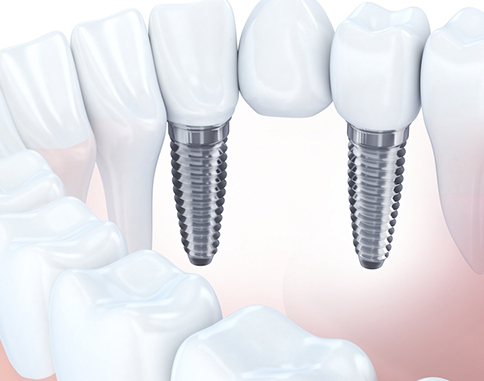
A traditional dental bridge requires crowns to attach to the abutment teeth. The connectors may be rigid/fixed or may have some flexibility. Dr. Wetmore will advise you on which is best for you. The rigid bridges require abutment teeth to be parallel, while the flexible ones allow some deviation.
A cantilever bridge only requires one abutment tooth for support, making it ideal for patients who have teeth on only one side of the gap. This type of dental bridge is not as common as it once was.
An implant-supported bridge is similar to a traditional bridge, except the crowns are placed over dental implants instead of natural teeth.
There are several factors that impact the cost of a dental bridge, including:
The type of dental bridge you choose also affects the cost:
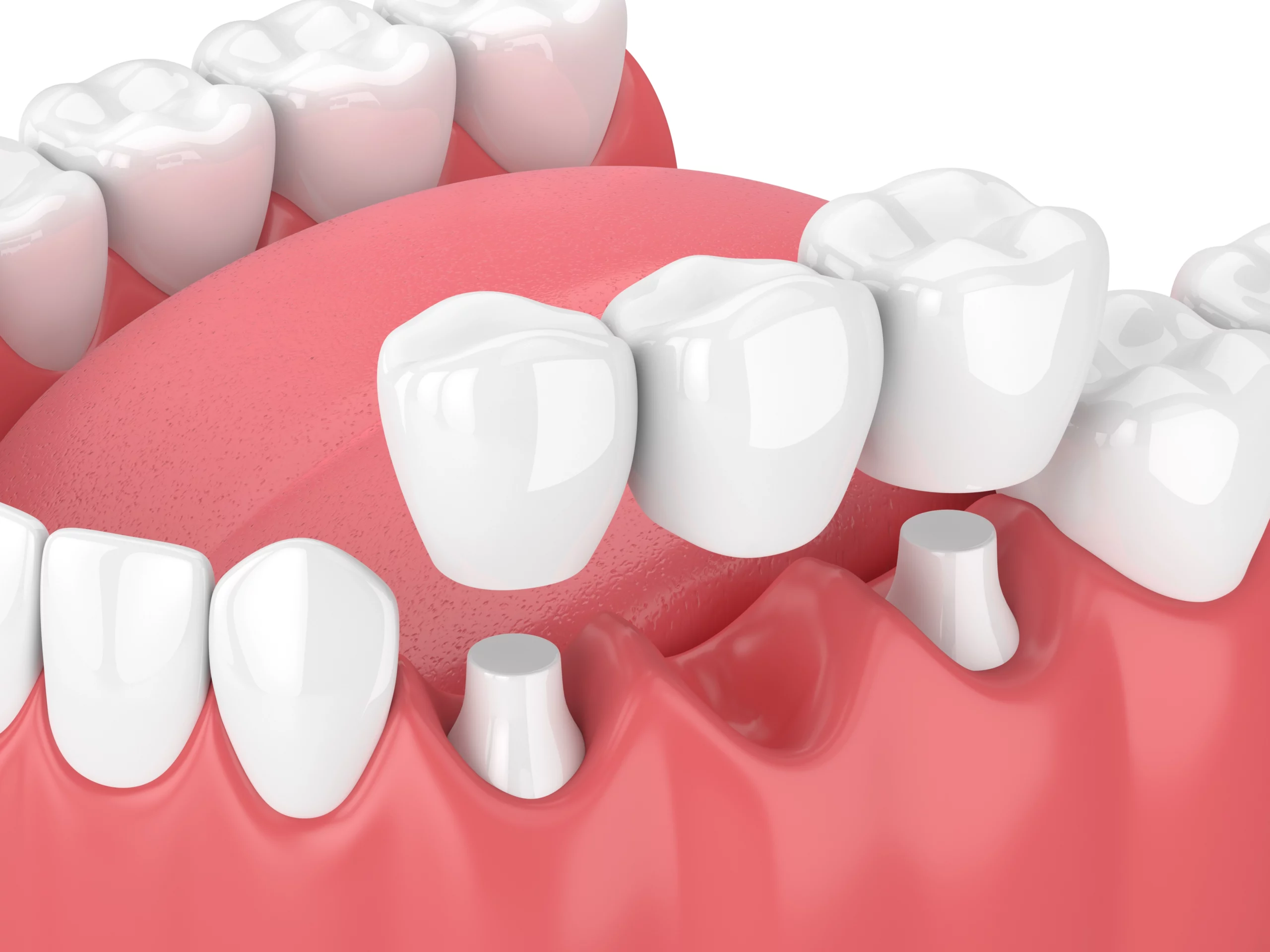
Dental bridges and dental implants are used to replace missing teeth. However, they do this in different ways: a dental implant replaces the entire structure of your tooth- root and all- while a dental bridge sits on top of the gums.
Dental implants are considered a permanent solution for missing teeth. A dental bridge may need to be replaced within 10 years. However, with proper care and maintenance, a dental bridge may also last a lifetime.
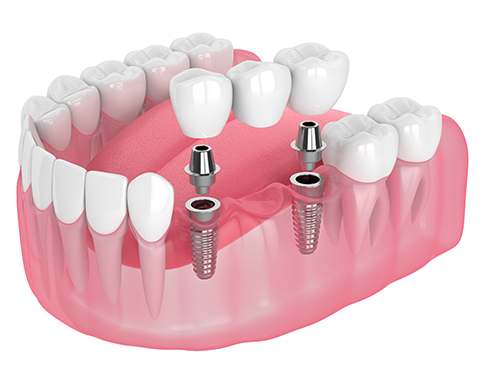
Regardless of which type of dental bridge you choose, you'll need at least 2 procedures, and the process will take some time. However, impressions are required for all types.
The first step in getting a traditional or cantilever bridge is the preparation of the abutment tooth or teeth. Dr. Wetmore will start by scraping off some of the enamel and dentin from the abutment teeth so the crowns can be placed. Temporary crowns will be placed until the bridge is ready.
When the bridge is ready, the temporary crowns will be removed, and the permanent crowns/bridge will be checked for proper fit. If it looks and feels good, the bridge will be cemented in place.
An implant-supported bridge requires more appointments than any other. First, the implants will need to be placed. A temporary bridge may be placed while you are healing. Once you have healed from the implant surgery, the permanent bridge can be placed. Dr. Wetmore will ensure that the bridge fits properly and then will attach the crowns on each end of the bridge to the abutments on the implants. Your natural teeth are not affected.
A dental bridge is a permanent tooth restoration because it is fixed in place. Only the dentist can remove it during exams and cleanings. However, it may not last forever. Dr. Wetmore will explain the best way to take care of your bridge to ensure that you get the most out of it. Advantages of Dental Bridges
There are several advantages offered by dental bridges:
Our patients at Sunflower Dental Spa often have questions about restorative dental procedures such as dental bridges. Some of the most common questions we get are:
If you believe that you might be a candidate for restorative dental procedures like crowns or bridges, contact our office to schedule your consultation. Sunflower Dental Spa is not your average dental office. We combine the expertise of a respected cosmetic dentist with a spa-like atmosphere. We offer amenities including heated massage chairs, pillows/blankets, eye masks, complimentary beverages, and more.
We are located at 4095 US Highway 1 in Rockledge, Florida. Our office hours are Monday, Wednesday, Thursday, and Friday, 8:30 AM to 4:30 PM. We are looking forward to meeting with you and restoring the functionality and aesthetics of your smile.